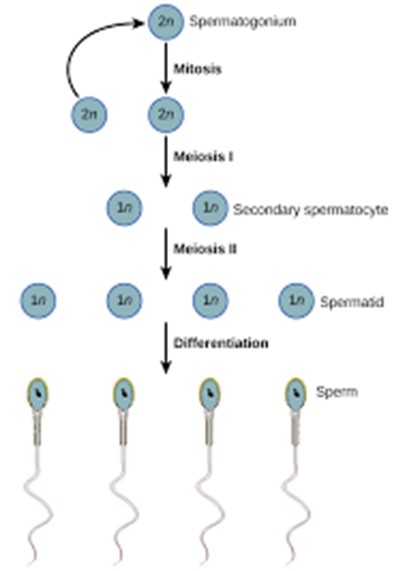Which of the following describes meiosis as it takes place in the testes?
Spermatozoa
Spermiogenesis
Spermatogenesis
Spermatocytes
The Correct Answer is C
a. Spermatozoa: These are the mature male gametes (sperm cells) that result from spermatogenesis but do not describe the process of meiosis itself.
b. Spermiogenesis: This is the final stage of spermatogenesis, where spermatids undergo morphological changes to become mature spermatozoa.
c. Spermatogenesis: This is the process that includes both meiosis and subsequent maturation steps, resulting in the formation of spermatozoa. It involves the production of haploid sperm cells from diploid germ cells.

d. Spermatocytes: These are the cells that undergo meiosis during spermatogenesis. Primary spermatocytes undergo the first meiotic division to form secondary spermatocytes, which then undergo the second meiotic division to produce spermatids.
Nursing Test Bank
Naxlex Comprehensive Predictor Exams
Related Questions
Correct Answer is A
Explanation
a. 1 to 2 liters: Correct. The average adult typically produces about 1 to 2 liters of urine per day.
b. 3 to 5 liters: This is an unusually high amount of urine production and is not typical for most adults.
c. 5 to 7 liters: This is an excessively high amount of urine production and would usually indicate a medical condition.
d. 2 to 4 liters: This range is slightly higher than average but can still be considered normal under certain conditions such as increased fluid intake or diuretic use.
Correct Answer is B
Explanation
a: Artificial passive - Artificial passive immunity involves the transfer of pre-made antibodies from one individual to another, such as through injection of immune serum or administration of antibodies produced in a laboratory.
b. Artificial active: Artificial active immunity is acquired through vaccination, where a person's immune system is exposed to a weakened or inactive form of a pathogen, such as the varicella (chickenpox) virus, to stimulate an immune response and the production of antibodies.
c: Natural active - Natural active immunity occurs when a person is exposed to a pathogen in the environment and develops an immune response, such as contracting and recovering from a disease like chickenpox.
d: Natural passive - Natural passive immunity involves the transfer of antibodies from a mother to her baby, such as through breastfeeding or placental transfer of antibodies during pregnancy.
Whether you are a student looking to ace your exams or a practicing nurse seeking to enhance your expertise , our nursing education contents will empower you with the confidence and competence to make a difference in the lives of patients and become a respected leader in the healthcare field.
Visit Naxlex, invest in your future and unlock endless possibilities with our unparalleled nursing education contents today
Report Wrong Answer on the Current Question
Do you disagree with the answer? If yes, what is your expected answer? Explain.
Kindly be descriptive with the issue you are facing.
